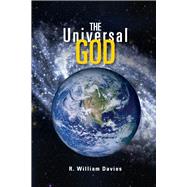The Universal God The Search for God in the Twenty-First Century
, by Davies, R. William- ISBN: 9781098341084 | 1098341082
- Cover: Paperback
- Copyright: 3/1/2021
The full title of this book is: "The Universal God, The Search for God in the Twenty-First Century". This book is written as a 'spiritual' quest to find God. The emphasis within this search is on the 'spiritual' and not the 'traditional' vision of God. The objective of this book is to allow the reader to independently search, define and better understand God's 'potential' within their own individual lives. There probably are no two readers who will read this book and come away with the exact same set of conclusions at the book's end.
The search begins within the major modern religions: Hinduism, Confucianism/Taoism, Buddhism, Judaism, Christianity, and Islam. Each of these religions, in their own ways reveal God to us; sometimes in visions that are 'shared in common' with each other; and sometimes, in very startling and different visions. Within the context of this book, the author will discuss both those shared visions as well as those visions that are different and unique from each other.
This book differs from most of the other comparative religion books that are on the market. The 'dogmas, religious practices and rituals within each of these religions are not discussed in any in-depth detail. The book instead focuses its search on those 'divine sparks' and 'spiritual inspirations' that originally brought each of these religions into existence. The comparisons within this book are focused on the lives, direct spiritual teachings and theologies of those individuals and sources that gave birth and sparked the founding of each of these religions. If we are to find God's 'Spirituality', it must come from going directly back in time to each religions' inspirational origins. The book is written to make direct comparisons between what Jesus said, to what the Buddha said, to what Mohammed said, to what Krishna said, to what Confucius said, to what Moses (and the other Jewish prophets) said, and to what Lao-tzu said. When the founding teachings (which are the direct spiritual source of each of these religions) are compared, they are found to have many teachings that are 'shared in common' with each other.
The book is divided into three major sections. The first section introduces the premise for the book; establishes definitions that will allow the reader to understand the differing terminologies that each of the religions use; and then, provide guidelines for understanding the remainder of the book. The second section introduces and discusses each of the religions within their own individual and self-contained chapters. The third section is titled 'Commentary'. This section discusses the many teachings and beliefs that these religions do have in common with each other, as well as give explanations for those beliefs that are unique and individual to only one of the religions.
This book can equally function as a book for individual study or be used as a textbook for comparative religions study.
The search begins within the major modern religions: Hinduism, Confucianism/Taoism, Buddhism, Judaism, Christianity, and Islam. Each of these religions, in their own ways reveal God to us; sometimes in visions that are 'shared in common' with each other; and sometimes, in very startling and different visions. Within the context of this book, the author will discuss both those shared visions as well as those visions that are different and unique from each other.
This book differs from most of the other comparative religion books that are on the market. The 'dogmas, religious practices and rituals within each of these religions are not discussed in any in-depth detail. The book instead focuses its search on those 'divine sparks' and 'spiritual inspirations' that originally brought each of these religions into existence. The comparisons within this book are focused on the lives, direct spiritual teachings and theologies of those individuals and sources that gave birth and sparked the founding of each of these religions. If we are to find God's 'Spirituality', it must come from going directly back in time to each religions' inspirational origins. The book is written to make direct comparisons between what Jesus said, to what the Buddha said, to what Mohammed said, to what Krishna said, to what Confucius said, to what Moses (and the other Jewish prophets) said, and to what Lao-tzu said. When the founding teachings (which are the direct spiritual source of each of these religions) are compared, they are found to have many teachings that are 'shared in common' with each other.
The book is divided into three major sections. The first section introduces the premise for the book; establishes definitions that will allow the reader to understand the differing terminologies that each of the religions use; and then, provide guidelines for understanding the remainder of the book. The second section introduces and discusses each of the religions within their own individual and self-contained chapters. The third section is titled 'Commentary'. This section discusses the many teachings and beliefs that these religions do have in common with each other, as well as give explanations for those beliefs that are unique and individual to only one of the religions.
This book can equally function as a book for individual study or be used as a textbook for comparative religions study.







